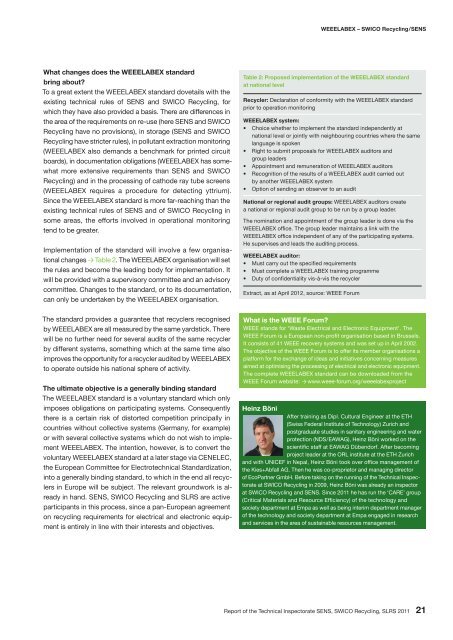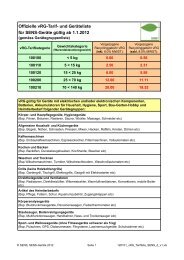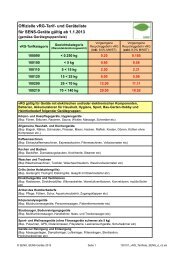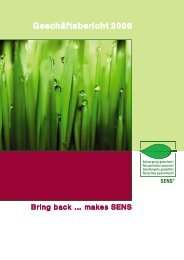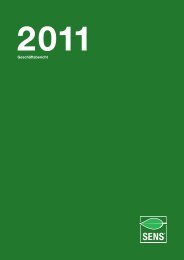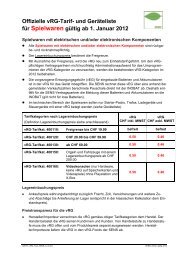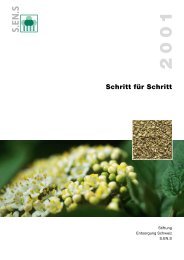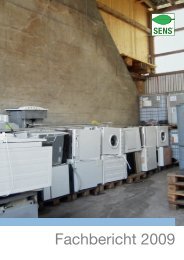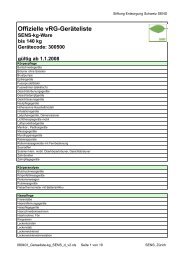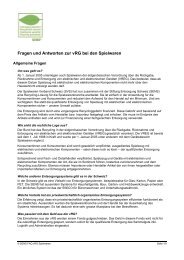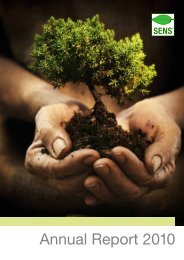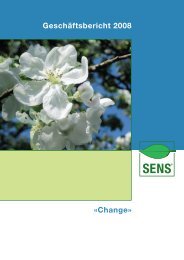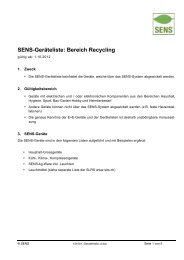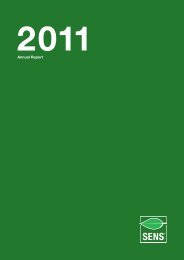Report of the Technical Inspectorate SENS, SWICO Recycling, SLRS
Report of the Technical Inspectorate SENS, SWICO Recycling, SLRS
Report of the Technical Inspectorate SENS, SWICO Recycling, SLRS
You also want an ePaper? Increase the reach of your titles
YUMPU automatically turns print PDFs into web optimized ePapers that Google loves.
What changes does <strong>the</strong> WEEELABEX standard<br />
bring about?<br />
To a great extent <strong>the</strong> WEEELABEX standard dovetails with <strong>the</strong><br />
existing technical rules <strong>of</strong> <strong>SENS</strong> and <strong>SWICO</strong> <strong>Recycling</strong>, for<br />
which <strong>the</strong>y have also provided a basis. There are differences in<br />
<strong>the</strong> area <strong>of</strong> <strong>the</strong> requirements on re-use (here <strong>SENS</strong> and <strong>SWICO</strong><br />
<strong>Recycling</strong> have no provisions), in storage (<strong>SENS</strong> and <strong>SWICO</strong><br />
<strong>Recycling</strong> have stricter rules), in pollutant extraction monitoring<br />
(WEEELABEX also demands a benchmark for printed circuit<br />
boards), in documentation obligations (WEEELABEX has somewhat<br />
more extensive requirements than <strong>SENS</strong> and <strong>SWICO</strong><br />
<strong>Recycling</strong>) and in <strong>the</strong> processing <strong>of</strong> cathode ray tube screens<br />
(WEEELABEX requires a procedure for detecting yttrium).<br />
Since <strong>the</strong> WEEELABEX standard is more far-reaching than <strong>the</strong><br />
existing technical rules <strong>of</strong> <strong>SENS</strong> and <strong>of</strong> <strong>SWICO</strong> <strong>Recycling</strong> in<br />
some areas, <strong>the</strong> efforts involved in operational monitoring<br />
tend to be greater.<br />
Implementation <strong>of</strong> <strong>the</strong> standard will involve a few organisational<br />
changes � Table 2. The WEEELABEX organisation will set<br />
<strong>the</strong> rules and become <strong>the</strong> leading body for implementation. It<br />
will be provided with a supervisory committee and an advisory<br />
committee. Changes to <strong>the</strong> standard, or to its documentation,<br />
can only be undertaken by <strong>the</strong> WEEELABEX organisation.<br />
The standard provides a guarantee that recyclers recognised<br />
by WEEELABEX are all measured by <strong>the</strong> same yardstick. There<br />
will be no fur<strong>the</strong>r need for several audits <strong>of</strong> <strong>the</strong> same recycler<br />
by different systems, something which at <strong>the</strong> same time also<br />
improves <strong>the</strong> opportunity for a recycler audited by WEEELABEX<br />
to operate outside his national sphere <strong>of</strong> activity.<br />
The ultimate objective is a generally binding standard<br />
The WEEELABEX standard is a voluntary standard which only<br />
imposes obligations on participating systems. Consequently<br />
<strong>the</strong>re is a certain risk <strong>of</strong> distorted competition principally in<br />
countries without collective systems (Germany, for example)<br />
or with several collective systems which do not wish to implement<br />
WEEELABEX. The intention, however, is to convert <strong>the</strong><br />
voluntary WEEELABEX standard at a later stage via CENELEC,<br />
<strong>the</strong> European Committee for Electrotechnical Standardization,<br />
into a generally binding standard, to which in <strong>the</strong> end all recyclers<br />
in Europe will be subject. The relevant groundwork is already<br />
in hand. <strong>SENS</strong>, <strong>SWICO</strong> <strong>Recycling</strong> and <strong>SLRS</strong> are active<br />
participants in this process, since a pan-European agreement<br />
on recycling requirements for electrical and electronic equipment<br />
is entirely in line with <strong>the</strong>ir interests and objectives.<br />
WEEELABEX – <strong>SWICO</strong> <strong>Recycling</strong> / <strong>SENS</strong><br />
Table 2: Proposed implementation <strong>of</strong> <strong>the</strong> WEEELABEX standard<br />
at national level<br />
Recycler: Declaration <strong>of</strong> conformity with <strong>the</strong> WEEELABEX standard<br />
prior to operation monitoring<br />
WEEELABEX system:<br />
• Choice whe<strong>the</strong>r to implement <strong>the</strong> standard independently at<br />
national level or jointly with neighbouring countries where <strong>the</strong> same<br />
language is spoken<br />
• Right to submit proposals for WEEELABEX auditors and<br />
group leaders<br />
• Appointment and remuneration <strong>of</strong> WEEELABEX auditors<br />
• Recognition <strong>of</strong> <strong>the</strong> results <strong>of</strong> a WEEELABEX audit carried out<br />
by ano<strong>the</strong>r WEEELABEX system<br />
• Option <strong>of</strong> sending an observer to an audit<br />
National or regional audit groups: WEEELABEX auditors create<br />
a national or regional audit group to be run by a group leader.<br />
The nomination and appointment <strong>of</strong> <strong>the</strong> group leader is done via <strong>the</strong><br />
WEEELABEX <strong>of</strong>fice. The group leader maintains a link with <strong>the</strong><br />
WEEELABEX <strong>of</strong>fice independent <strong>of</strong> any <strong>of</strong> <strong>the</strong> participating systems.<br />
He supervises and leads <strong>the</strong> auditing process.<br />
WEEELABEX auditor:<br />
• Must carry out <strong>the</strong> specified requirements<br />
• Must complete a WEEELABEX training programme<br />
• Duty <strong>of</strong> confidentiality vis-à-vis <strong>the</strong> recycler<br />
Extract, as at April 2012, source: WEEE Forum<br />
What is <strong>the</strong> WEEE Forum?<br />
WEEE stands for ‘Waste Electrical and Electronic Equipment’. The<br />
WEEE Forum is a European non-pr<strong>of</strong>it organisation based in Brussels.<br />
It consists <strong>of</strong> 41 WEEE recovery systems and was set up in April 2002.<br />
The objective <strong>of</strong> <strong>the</strong> WEEE Forum is to <strong>of</strong>fer its member organisations a<br />
platform for <strong>the</strong> exchange <strong>of</strong> ideas and initiatives concerning measures<br />
aimed at optimising <strong>the</strong> processing <strong>of</strong> electrical and electronic equipment.<br />
The complete WEEELABEX standard can be downloaded from <strong>the</strong><br />
WEEE Forum website: � www.weee-forum.org / weeelabexproject<br />
Heinz Böni<br />
After training as Dipl. Cultural Engineer at <strong>the</strong> ETH<br />
(Swiss Federal Institute <strong>of</strong> Technology) Zurich and<br />
postgraduate studies in sanitary engineering and water<br />
protection (NDS / EAWAG), Heinz Böni worked on <strong>the</strong><br />
scientific staff at EAWAG Dübendorf. After becoming<br />
project leader at <strong>the</strong> ORL institute at <strong>the</strong> ETH Zurich<br />
and with UNICEF in Nepal, Heinz Böni took over <strong>of</strong>fice management <strong>of</strong><br />
<strong>the</strong> Kies+Abfall AG. Then he was co-proprietor and managing director<br />
<strong>of</strong> EcoPartner GmbH. Before taking on <strong>the</strong> running <strong>of</strong> <strong>the</strong> <strong>Technical</strong> <strong>Inspectorate</strong><br />
at <strong>SWICO</strong> <strong>Recycling</strong> in 2009, Heinz Böni was already an inspector<br />
at <strong>SWICO</strong> <strong>Recycling</strong> and <strong>SENS</strong>. Since 2011 he has run <strong>the</strong> ‘CARE’ group<br />
(Critical Materials and Resource Efficiency) <strong>of</strong> <strong>the</strong> technology and<br />
society department at Empa as well as being interim department manager<br />
<strong>of</strong> <strong>the</strong> technology and society department at Empa engaged in research<br />
and services in <strong>the</strong> area <strong>of</strong> sustainable resources management.<br />
<strong>Report</strong> <strong>of</strong> <strong>the</strong> <strong>Technical</strong> <strong>Inspectorate</strong> <strong>SENS</strong>, <strong>SWICO</strong> <strong>Recycling</strong>, <strong>SLRS</strong> 2011 21


